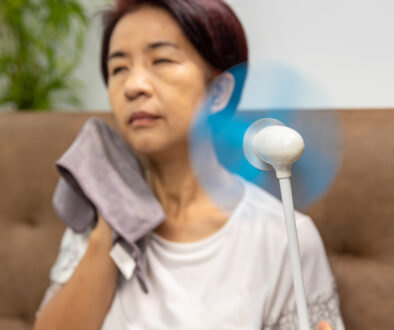The Five Best Ways to Get Relief from Hot Flashes
Even if you haven’t entered menopause, chances are that you’ve heard someone complain about the inconvenience and discomfort of hot flashes. Roughly 75 percent of all menopausal women experience them, and for 80 percent, the hot flashes continue for two years.
“This is by far the most common—and often most troublesome—symptom of menopause, although sometimes they may start before a woman has her last period,” said Dr. Melinda Everett, WHNCP. “We want our patients to know that they don’t have to continue to experience hot flashes. We have effective solutions to help you.”
What causes hot flashes?
Hot flashes likely result from different factors centering around hormonal changes. (Mayo Clinic). In addition, fluctuations in your hypothalamus may also be a contributing element. The hypothalamus is the part of your body that helps regulate its temperature.
What triggers a hot flash?
Hot flashes can be triggered by many things, including:
- Spicy foods
- Alcohol
- Hot weather
- Smoking
- Caffeine
- Stress
When are you more likely to get a hot flash?
Most hot flashes occur when you are in a heated environment, such as a warm room or outside on a hot day. Women who smoke are more likely to get a hot flash after smoking and experience more hot flashes than women who don’t smoke. Hot flashes also frequently occur at night.
How do you know you’re having a hot flash?
If you feel a sudden warmth that is most intense around your face, chest and neck, you could be having a hot flash. These are also accompanied by sweating and red skin.
How to Get Relief From Hot Flashes
While hot flashes are inconvenient, they are rarely dangerous. Following are five tips to help you minimize the discomfort of hot flashes and level out your hormones to minimize their frequency.
1. Participating in hormonal therapy
Decreased estrogen levels can contribute to hot flashes, therefore, hormonal therapy can be quite effective. Depending upon your individual situation, you may be able to take estrogen alone or you may need to take progesterone with it. If you have had a hysterectomy, you will be able to take estrogen alone. However, if you still have a uterus, you should also take progesterone with estrogen. By adding progesterone, you help protect yourself from developing endometrial cancer.
If you have any concerns or questions, we encourage you to ask our physicians or our wonderful nurse midwives.
2. Taking antidepressants
Sometimes, low doses of antidepressants can treat hot flashes, particularly Effexor, Paxil and Prozac. (Cleveland Clinic) Research suggests that antidepressants are effective because they modulate serotonin. (American Psychiatric Association). Serotonin is a chemical that is vital for brain and nerve cell function.
3. Adjusting your diet
Avoiding spicy foods, alcohol and caffeine can reduce the number of hot flashes. Isoflavones, which are found in soybeans, chickpeas and lentils, are plant-based estrogens. While not as effective as regular hormone therapy, they may provide moderate relief.
Please speak with us before trying any alternative therapies or taking supplements such as black cohosh. It’s important to remember that just because something is natural, that doesn’t mean it is safe. Natural supplements may interact with other medications.
4. Taking anti-seizure medications
Gabapentin is moderately effective–women can experience a 50 to 60 percent reduction in hot flashes– but it can cause dizziness, drowsiness and headaches. It’s found in medications such as Neurontin and Gralise. Some women do not consider this option because of the potential side effects. (American Cancer Society) Speak with us to see if this would be an appropriate choice for you.
5. Taking medications to treat high blood pressure
Clonidine, which goes by the name Catapres and Kapvay, can also provide some relief. However, it also has side effects which can include dry mouth, constipation, drowsiness and dizziness. We will work with you to determine if the benefits outweigh the disadvantages of the side effects.
We Offer a Customized Approach to Provide Relief from Hot Flashes
The world is full of erroneous information. From internet ads claiming to have the cure for hot flashes to old wives tales that are dubious at best. This is why it is so important to establish a good relationship with your Chapel Hill OBGYN professionals so we can be partners in your care and help you separate fact from fiction.
We have treated generations of women, and we are proud of our compassionate, specialized and state-of-the-art care. We welcome the privilege of treating you. Please contact us today to schedule an appointment.
For more than 40 years, Chapel Hill OBGYN has served women in the Triangle area, sharing the joy of little miracles and supporting them during challenges. Our board-certified physicians and certified nurse midwives bring together the personal experience and convenience of a private practice with the state-of-the-art resources found at larger organizations. To schedule an appointment, please contact us for more information.
American Cancer Society. “Anti-Seizure Medications for Hot Flashes.” Online.
American Psychiatric Association. “Antidepressants Reduce Hot Flashes, May Be Estrogen
Alternative.” Online.
Cleveland Clinic. “Non-Hormonal Treatment and Relief for Hot Flashes. “ Online.
Johns Hopkins Medicine. “Introduction to Menopause.” Online.
Mayo Clinic. “Hot Flashes – Causes and Symptoms.” Online.




